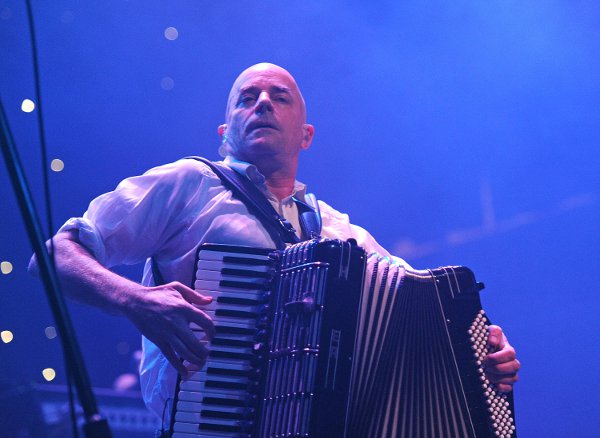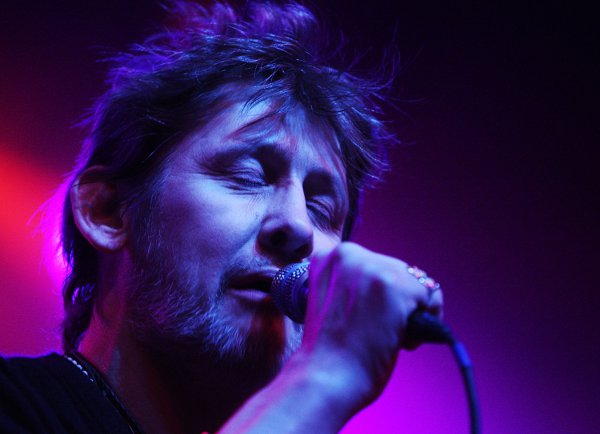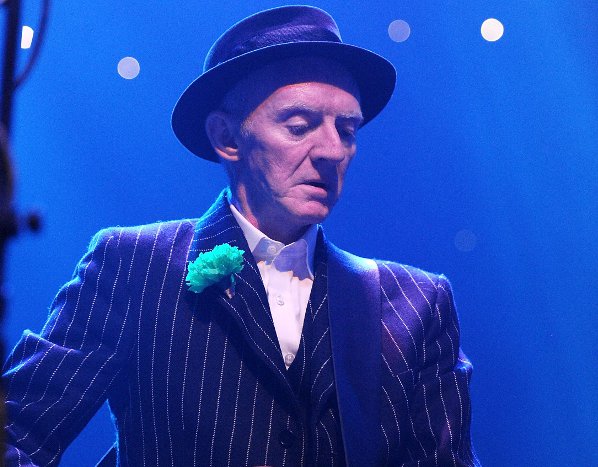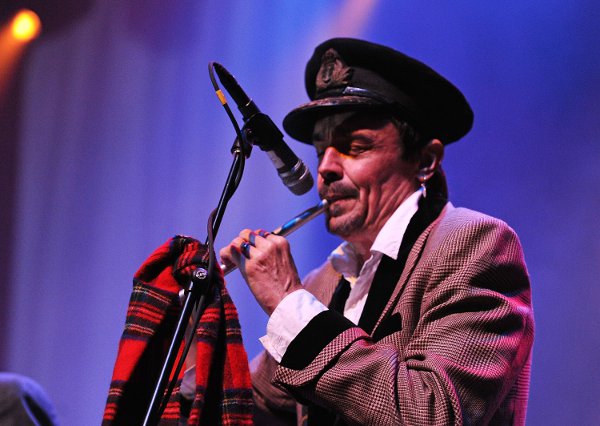WHEN the Pogues perform their classic 1985 album, Rum, Sodomy & the Lash, in its entirety this week over four gigs, it will be significant in that they will mark the group’s first performances since the sad death of guitarist Philip Chevron last October.
It’s fitting in a way that, in marking Chevron’s death, the band has retreated into their past and back to the period of that seminal 1985 album.
Rum, Sodomy and the Lash featured a mix of originals and standards such as Ewan MacColl's Dirty Old Town, which the Pogues popularised for a new generation. Their vital original songs also would become standards in their own right. When accordion player James Fearnley first heard A Pair Of Brown Eyes he realised Shane MacGowan's songwriting had shifted gear.
"Musically that song had a timeless eternal vibe,” Fearnley tells me down the line from his home in LA. “I really enjoyed the chords; it felt like there was a circular motion about the chord progression. The vocal melody was sublime and there was this instrumental section which had a real purity about it. I found that very appealing.
“Against that music you have lyrics which I found difficult to track, they were almost counter to the music and that was very exciting. He (MacGowan) would smash up an image in shards and rearrange it as a way to find the story. I love the way you have Shane as narrator and how he gets through the story of the song. There's a jaded irony about it where he's making light out of dismemberment and the horrors of war; I always like that about Shane's songs-they pack an extra punch because he holds back the punch."
The video for A Pair of Brown Eyes, directed by Alex Cox (Sid & Nancy), was said to be comment on a totalitarian government and the politics of Thatcher. While the band were political, they stayed away from writing about the Troubles in the North of Ireland directly, which were rife during the period. At the same time they were unashamedly Irish when there was open racism and a sense of "keeping your head down" because of IRA activity.
 James Fearnley of The Pogues
James Fearnley of The Pogues"For us in the beginning, I don't think we were overly careful but what we were doing was just telling stories about people, most of the songs on that album were to do with individuals and how they cope with how difficult or exciting life can be... or how much you can drink,” says Fearnley.
“As far as I could see we weren't espousing anything up until Streets of Sorrow/Birmingham Six (from If I should Fall From Grace With God). At that point it became important to espouse something and even then it was about individuals rather than a political statement. But that was one of the most political songs we ever did and I think it helped their situation and brought their ordeal into the public mind in a different way. It was also a gesture of support for people who had been banged up in prison wrongly."
Rum, Sodomy and the Lash was produced by Elvis Costello. Fearnley’s memoir, Here Comes Everybody, is awash with absorbing anecdotes of his impact as a producer and, in particular, Shane MacGowan's fascination with Costello's guitar which he both coveted and loathed.
"It became a sort of vocal point for Shane,” remembers Fearnley. “It came across to me that when Elvis gave him the guitar he had Elvis where he wanted him. He (MacGowan) was conflicted about being given it - he didn't want it to be: ‘my songwriting I bequeath to you in the form of this guitar’; it wasn't even a great guitar, it was a crap (laughing). They were horrible looking things with plastic backs but there seemed to be some added significance to Shane being given this guitar, there was obviously some inner conflict for him in wanting to break it.
“It was a big thrill to work with Elvis,” adds Fearnley. “I had been a fan since 1977, I went to see him live around the time of My Aim Is True. I loved his stuff around that period so to have one of your heroes in the studio wanting to work with you was fantastic."
In the early 1980s, MacGowan would gather his friends around the bars at Euston railway station before boarding the boat train to Holyhead for the ferry to Dun Laoghaire. The legendary drinking sessions served as inspiration for the album's second single, Sally MacLennane, said Fearnley.
 Shane MacGowan
Shane MacGowan"I was always a little envious of Shane, it was almost this ritualistic thing where he'd get stocious and his friends would put him on the train to Ireland,” says Fearnley. “A lot from that song had also come from being a barman himself at the Great Ormond Street hospital bar. He knew about watering whiskey down from that I'm sure."
It was on Rum, Sodomy… tour that Glasgow became a stronghold for the band, recalls Fearnley. "It's hard to distinguish many of those nights up at Barrowlands,” he says. “The first time we played, it was palpable, the emotion in that place, it was the first really big gig that we did by ourselves playing in front of 2,000 people. I'd certainly never played in front of that many before so it felt big right from the start.
“Because of the make-up of Glasgow and the sectarian division reflected in the football teams, there was an intensity about it in any case, but for Jock Stein to have died the day before we played, it was even more so. There was often a convergence of elements and vectors in Glasgow.
“There was another time where Celtic had beaten Rangers, it was also St Patrick's Day, you can't ignore those convergences. I used to get a little bit scared by them. I never invested in football or the divide, I've always thought myself immune or maybe ignorant, it was not something I spent much time thinking about although there was a demand to think about it playing with The Pogues and getting to know Shane. I got to understanding the history as much as I could."
A number of negative elements affected the band on tour. In West Berlin fascist skin-heads marked Hitler's birthday by giving Nazi salutes during a small club gig. Former bass player Cait O' Riordan confronted them but inflamed the situation. It was left for Philip Chevron to stop a riot breaking out.
"Fair play to Cait,” says Fearnley. “On a visceral level she was outraged as one should justifiably be at Nazi salutes on Hitler's birthday at any gig, never mind ours. But she didn't have skills that you need to pull on in those situations. Philip was a consummate performer and a people person, he was able to figure the best way of turning attention away from what those guys were up to and brought it back to what we were doing. Both desires came from the same place. I'm not going to knock Cait for what she did but Philip had the right idea to reframe things and say what was important and it worked."
 Philip Chevron passed away in October
Philip Chevron passed away in OctoberThe forthcoming gigs will significantly be the first since the guitarist's passing. For the band it's a chance to grieve and say a final farewell.
"There is going to be a huge void on stage to not have Philip, there's been void since he died. Thousands Are Sailing is an indispensable song for us. To play that would be my way of saying goodbye to Philip. I couldn't come over for the funeral and I wasn't able to go to the testimonial gig in August so I'm due some grieving basically. That song was always a way maker for some transitions in my life. I'm so eager to be able to send Philip off by playing his song, that's what I want to do above anything else because The Pogues has been a family to me for many years.
“Philip had a great talent, he could write from such an intimate place within him. He made you feel he was writing about you. Just recently I was remixing Peace and Love with Steve Lillywhite and when we got to Lorelei we got to hear Philip's vocal at the same time as Kirsty's (MacColl) voice solo, it was tear inducing for both me and Steve to hear those two voices saying we'll never hear those again, it was a very powerful experience."
Speaking of Kirsty MacColl, Fairytale of New York has taken on a life of its own and again will mark an emotional moment at this time when the band play it next week.
"I'm not sure that all that many people are aware of the song in the States (where Fearnley now lives),” he says. “In the UK it's become a national institution but it operates outside the stratagem of regular Christmas songs. We hold our own beloved and contentious place elsewhere, it's not part of the Wham and Slade type of thing; it's elbowed its way into its own little compartment as far as Christmas songs go.
“Fairytale… is one of those indestructible type of songs; it's weird hearing it in a shopping centre in England because the words get lost a bit and it tends to sound jollier than it is."
 Spider Stacey
Spider StaceyThere can't be many drinking institutions around the U.K where Shane MacGowan hasn't enjoyed a beverage while on tour, he'll visit one of the most famous this Christmas propping up the Rovers Return while performing a restyled version of the song; Fairytale of Weatherfield when appearing in Coronation Street on December 20.
"It will be interesting to see what he does in it, I heard he's going to appear and I'm looking forward to it. It's weird for me because my dad used to be friends with Doris Speed who played Annie Walker the landlady at the Rovers it feels odd that Shane is in my territory of Manchester; I'm eager to see it."
Here Comes Everybody, Fearnley’s book, doesn't hold back from The Pogues darker times which could sometimes escalate into violence. Today the Mancunian Pogue is philosophical about run-ins with his mercurial front-man.
"I think this sounds trite but there's truth in it that if you know people who you have went through some intense experiences with, it's like sharing the same territory as members of a family. There are enduring relationships that I couldn't escape even if I wanted to with some of them. I've had a more problematic relationship with Shane than I have with many people, it might not have been the same for Shane but I can't speak for him (laughing).
"It's like the bonkers, f**ked up brother that you have to try and deal with but you can't let him go. We did in 1991 of course but they (The Pogues) are in my life whether I like it or not. The stuff we have made and invented, the success we've had and the things we've managed to get done and everything like that, it's very bonding for better or for worse."
The Pogues will play O2 Apollo, Manchester this Sunday (December 15); O2 Academy, Glasgow (17) and O2 Academy Brixton, London (19 & 20). The Pogues - 30 Years box set is out on Monday (16).

